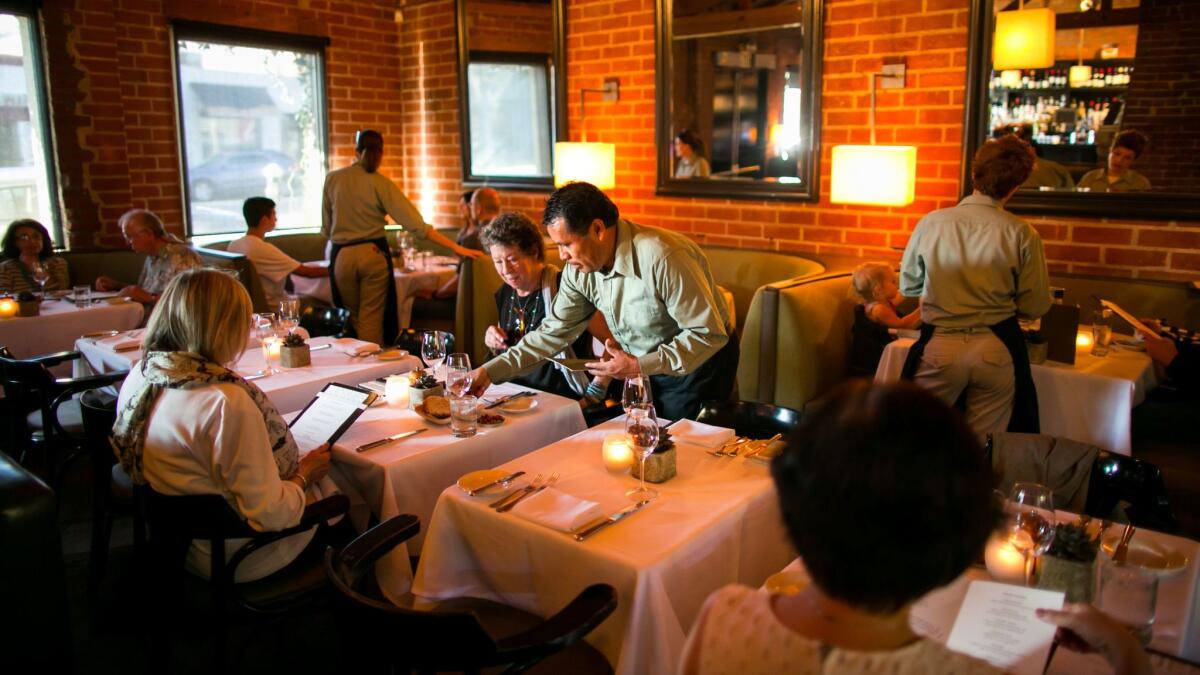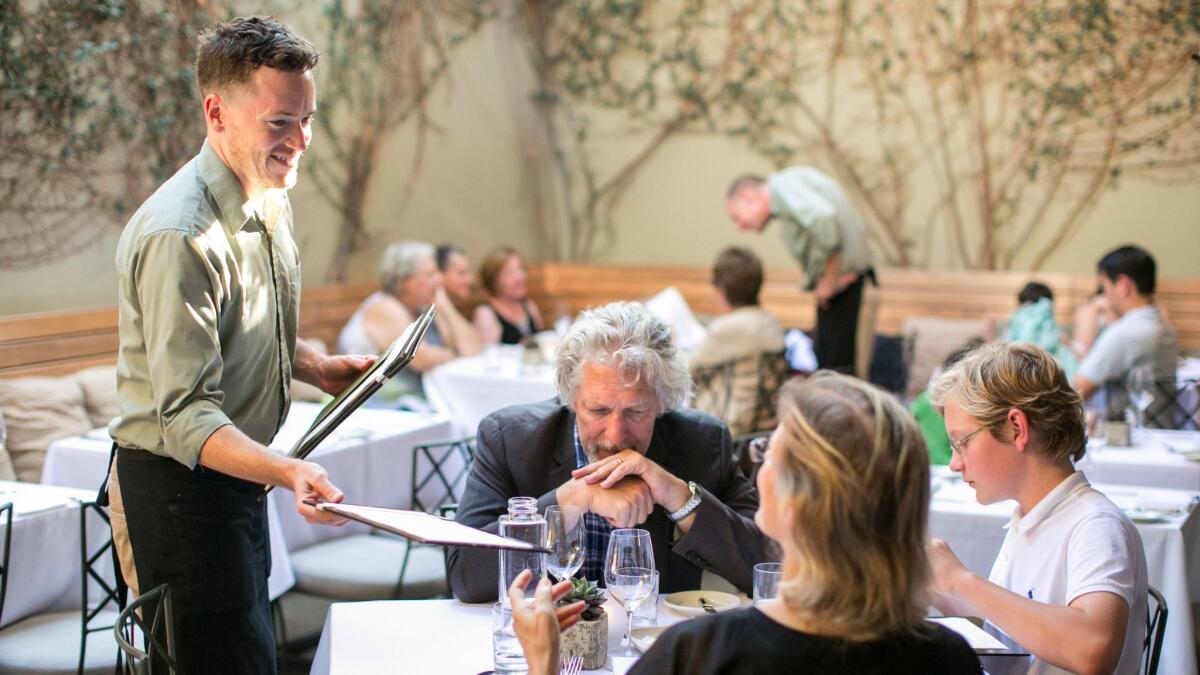Q&A: Lucques’ Caroline Styne talks about the restaurant labor crisis and how it will affect your dinner bill
- Share via
The costs of running a restaurant are not insignificant. There's rent; there are the ever increasing costs of ingredients. There are also taxes, so many taxes, plus routine expensive disasters such as broken walk-ins and faulty ice machines. And then there are labor costs.
Labor costs have received quite a bit of attention lately, thanks to a number of recent laws intended to benefit workers, especially low-wage workers, across all industries. In addition to a gradual increase in the minimum wage over the next few years, employers also must now contend with paid sick leave laws. Depending on their size, some employers also must provide healthcare to their employees. And the state Legislature is now considering some changes in overtime laws that may be costly for employers. No surprise, then, that from a restaurant owner’s point of view, there is much about labor models right now to consider and reconsider.
As part of Food Bowl, the Los Angeles Times’ monthlong food festival, on May 23 at the Fairmont Miramar Hotel in Santa Monica, a panel of restaurant industry folks will discuss some of these issues as part of an event called the Restaurant Labor Crisis Summit. Among other topics, they'll talk about fair wages, whether and how to pass increased costs to customers, and the tipping versus service charge debate.
In advance of the discussion, we emailed with one of the panelists, Caroline Styne, the co-owner with chef Suzanne Goin of
What are the major labor-related issues you're facing right now? How (if at all) do those issues differ from what you faced when, say, Lucques opened in 1998?
We’re facing a variety of issues: First, the availability of high-quality employees. There are far more restaurants in L.A. than there were when we opened Lucques and so we are constantly battling with all of the other restaurants in town for the few good people that are out there. The restaurateur/chef profession has gained a good deal in terms of the perception of glamour and fame, but the pool of potential candidates is still fairly lean. There are also issues with the millennial generation of employees whose attitudes are different from the older guard in that they don’t necessarily want to work as hard as they need to and expect to move up more quickly than is reality.
Second, we’re also facing all of the heftier expenses of the labor force in general, [including a] $15 minimum wage that is approaching, health insurance expenses and the exponential increases in workers compensation.

Los Angeles Times Food Bowl: A new kind of food festival »
One of the topics that will be discussed during the Restaurant Labor Crisis Summit is how to ensure all employees are paid a fair wage. How would you define a fair wage?
A fair wage is one at which a person can work full-time hours and be able to adequately support themselves. Obviously minimum wage is a minimum, but, at the very least, a person who is making minimum wage and working full time should not be living at the poverty level. At the same time, the general public needs to understand that in order to pay a living wage, prices of food, products and services will go up.
I don’t think the public has really come to terms with the overall effect that the increase in the minimum wage will have on those costs and that everyone will need to pay more for everything.
I don’t think the public has really come to terms with the overall effect that the increase in the minimum wage will have.
— Caroline Styne

You implemented a 3% healthcare surcharge in late 2014, and since then it's increased just slightly, to 3.5% — is that right? Overall, how has it been received by customers?
It’s been received fairly well. Only about 5% of our guests ask for the charge to be removed from their bill, and many have commented on how great they think it is. This surcharge did go up to 3.5%, but it still does not cover the entire cost of the insurance.
Other than the healthcare surcharge, can you share anything else you've done at the restaurants to absorb/handle the increased costs? Have you considered switching over to all-inclusive menu pricing?
We have considered both all-inclusive menu pricing and the idea of adding a service charge, but I’m very hesitant to do any of that. I think that it is received even more poorly by the public and has apparently had a negative effect on some of the businesses who have implemented those plans. It will also make it even more difficult to find quality employees to fill the front of house service positions.
If the law were to allow restaurants to include back of house in your tip pools, would that alleviate some of your labor cost concerns?
No, it wouldn’t. It would alleviate some of the disparity in income between the back of house and front of house, but it doesn’t alleviate the overall increasing cost of labor. What would greatly help is for California to adopt a tipped minimum wage, a wage that takes into account the tipped income and thereby lowers the hourly wage. This would help close the gap between the back of house and front of house and would greatly help the business financially.
The Restaurant Labor Crisis Summit is part of our monthlong Food Bowl festival and will take place at 11 a.m. May 23 at the Fairmont Miramar Hotel & Bungalows in Santa Monica. In addition to Caroline Styne, panelists include George Abou-Daoud (the Bowery, Delancey, Mission Cantina, among others), Yousef Ghalaini (Fig Restaurant), Josh Loeb (the Rustic Canyon Family of Restaurants),
ALSO:
Culinary SOS: Laura's winter citrus salad from Lucques restaurant
Eat your way across L.A.
Get our weekly Tasting Notes newsletter for reviews, news and more.
You may occasionally receive promotional content from the Los Angeles Times.







